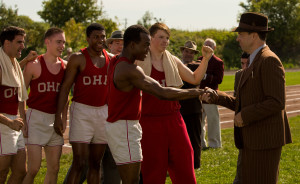Not only was Jason Sudeikis ready for the challenge of tackling his first dramatic role in Race, but he also knew the hurdle that would have to be overcome finding the soul of the man who coached Jesse Owens into history.
“Relative to what Stephan James (who plays Owens) is taking on, there is remarkably less stuff about Larry (Snyder, his coach),” Sudeikis told The Movie Mensch at the film’s recent press day.
But, he knew that this story was more important than any one of the specific characters outside of the one at the center. ”We have like three photographs of Larry. There wasn’t much, like an article here and an article there and an appearance on I think This is Your Life, when Jesse was on there as a contestant. So I got to see the way he spoke. But I didn’t attack it the way we would or prepare for impressions on SNL. I didn’t have to sound like that, I don’t think I would have been as keen to take it if I had to pretend to portray someone,” Sudeikis admitted.
Once the actor saw the screenplay for Race, he knew he could get there and more importantly, do the role and the film itself justice. “There is something about when I first read that script that I was like I think I know who this guy is. I just resonated with him and I liked what he had to say. I liked that he walked to walk as well and I like that is was convenient, in my personal opinion, that he was on the right side of history.”
There was something that he gleaned from Race director Stephen Hopkins that put the comedic actor tackling his first dramatic role over the top. “It’s a quote from Jesse Owens himself in his autobiography saying that Larry was an accidental non-racist. Yeah it’s funny at first because it feels like a Yogi Berra kind of quote. Like what does that mean? It made perfect sense and I can’t totally articulate it. Other than he doesn’t care about black, white or anything. Fast or slow, work hard and I think that’s a beautiful sentiment. And one that is all of the societal pressure that he was dealing with on that campus, much less the entire nation at that time,” he added.
“He just bucked all of that. He didn’t care. I felt connected to the big overall story of good versus evil, but then the very human story and the connection between Larry and Jesse and them being almost like Butch and Sundance. Or even more convenient, probably like 48 Hours or Brian’s Song. It had that kind of connection and that was the kind of bond that natural came with Stephan and I.”
Sudeikis is not unfamiliar to tackling period pieces and getting inside characters from another time, but adding the historical and dramatic element was something new. Yet, at the same time when he broke it down… it truly wasn’t.
“Drama or comedy for me, it’s about trying to make it as believable to the person that I am acting with and the true seer of all, the camera. I am not paying attention to that. It’s just about moments,” Sudeikis said. “I’m used to playing scenes as believable as possible whether I’m smuggling drugs across the Mexican border (in We’re the Millers) or murdering bosses (in Horrible Bosses) but trying to make it feel real. Those moments are designed to end with laugher and dramas are designed for whatever reactions. There are a few laughs and a few moments of levity in this very intense movie. There are moments of cheering and moments of pause. You are not aiming for that you are trying to make it feel real. It’s just about stringing together a series of moments. But my approach to it is no different.”
The actor reported growing up in a world that was heavily influenced by what Owens did in Berlin, winning all those gold medals and raining on the Nazis parade of racism. “I was lucky enough to play sports in Kansas City, which is a very diverse town. So I’ve been lucky enough to have been surrounded by different races my entire life. I’m one of those suburban white kids that bought Straight Outta Compton that forced the revolution that that album, specifically, and that group, which we know mostly now from the movie, caused that shift. I’ve always been keen into it,” he said.
“When I saw Eddie Murphy in Beverly Hills Cop, it didn’t matter to me that he was black. He was just a cool guy who was avenging his best friend’s murder. For me, personally, he was just the coolest, funniest guy in the world. The fact that he was black was secondary to his spirit. I feel that every bit of my point of view that I brought that to Larry. Larry and I were simpatico in that. Larry knows from the intention, and Jesse knows the intention that Larry’s coming from, and how it doesn’t really matter to him. That’s where the accidental non-racist comes from.”



